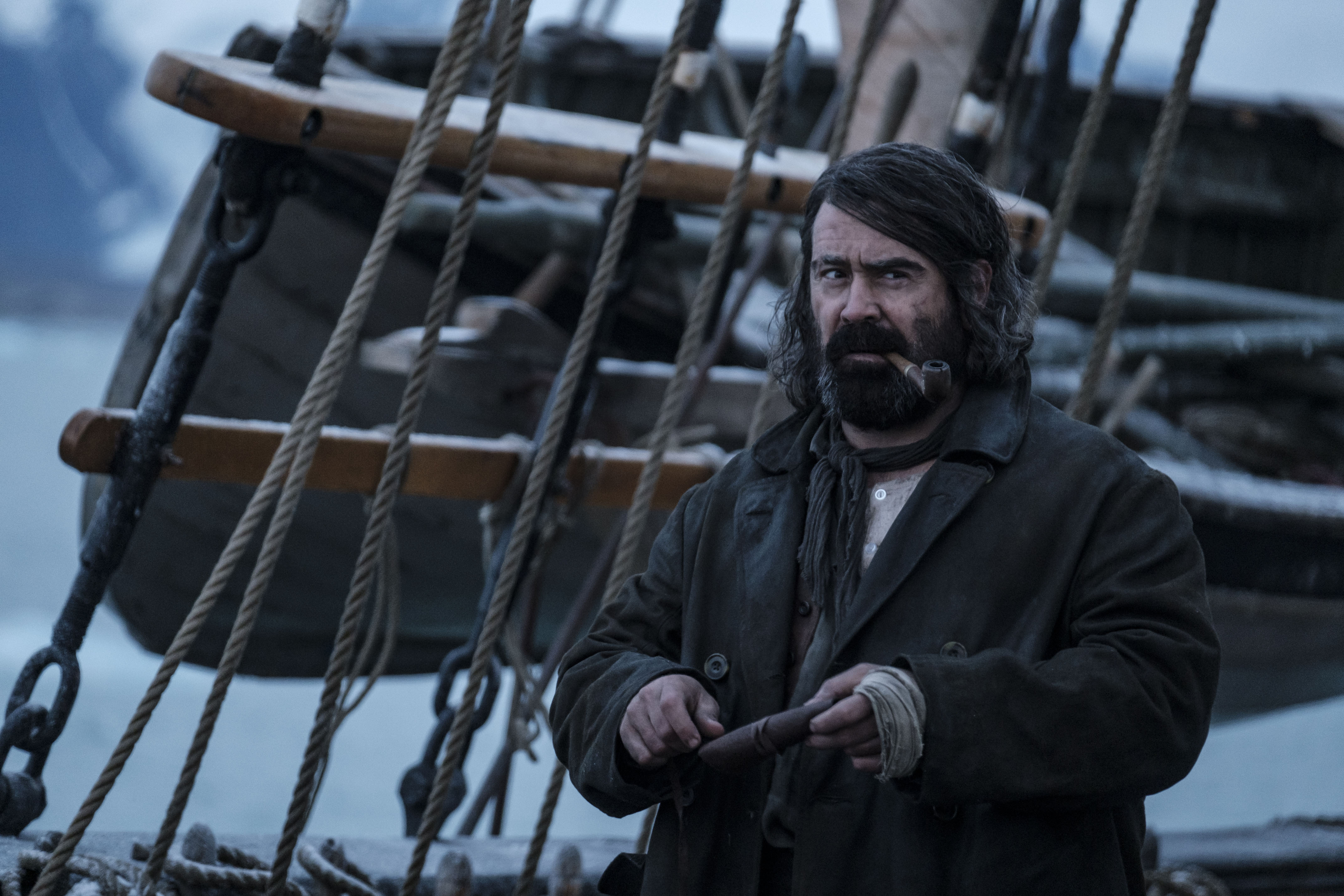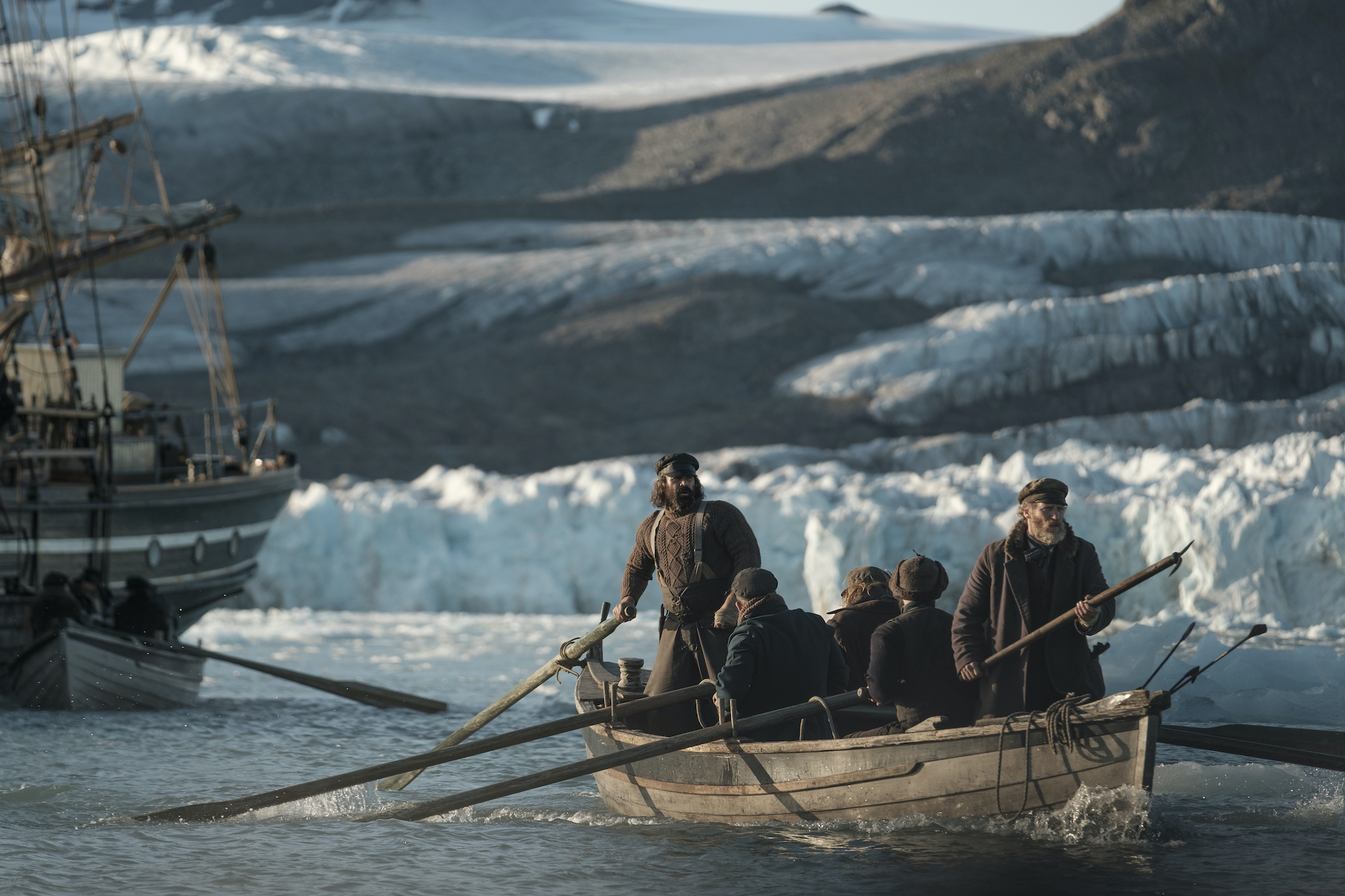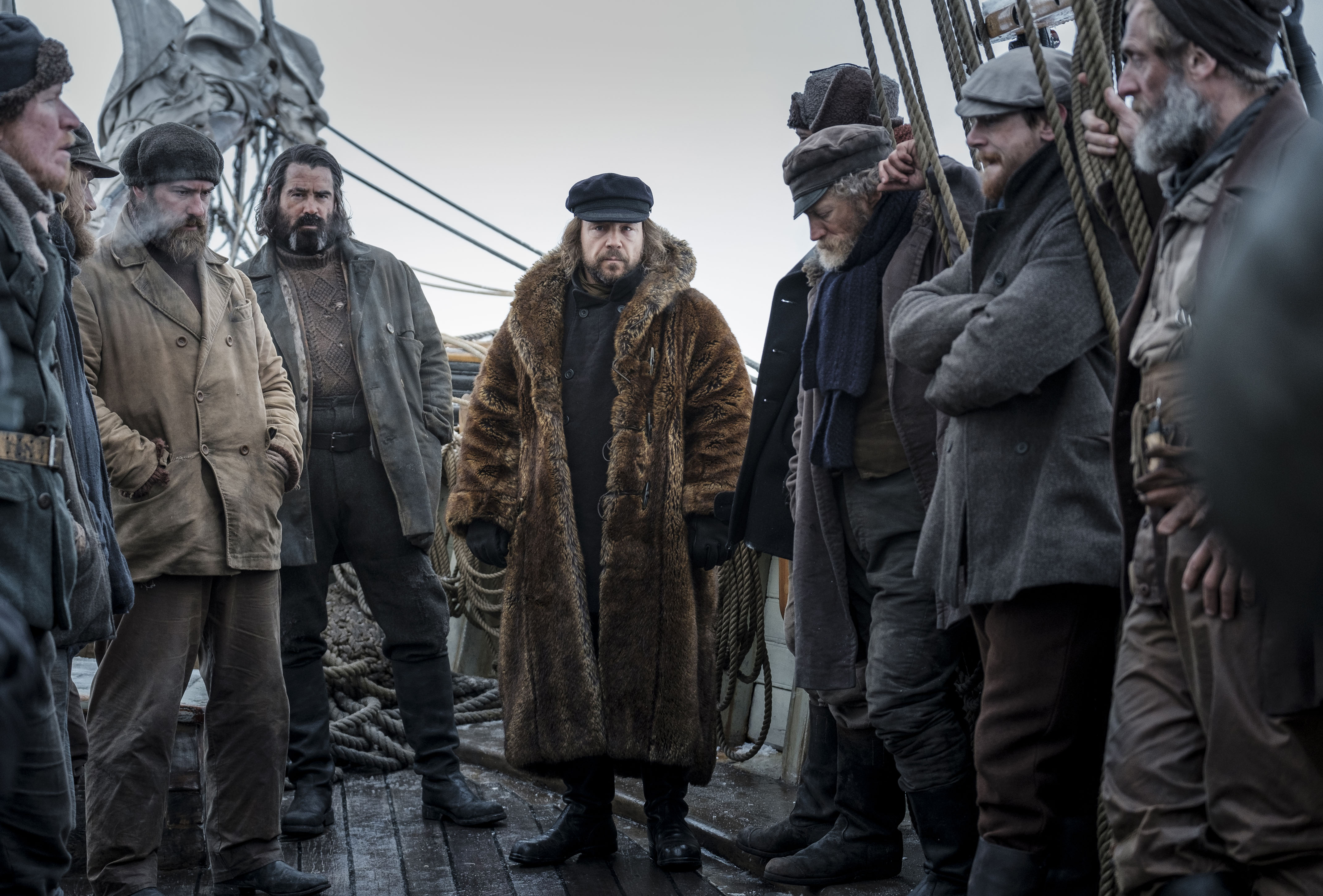What to Watch Verdict
It isn't only the location that makes 'The North Water' a triumph as Andrew Haigh's adaptation is a striking exploration of masculinity, arrogance, and the drive to survive.
Pros
- +
🌊 The setting and how cinematographer Nicolas Bolduc captures it.
- +
🌊 Jack O'Connell and Colin Farrell's performances.
- +
🌊 A strong supporting cast.
- +
🌊 Somehow the perpetual dread is elevated with each episode.
- +
🌊 A haunting score.
- +
🌊 The various themes and how Haigh touches on some different elements than previous explorer tales.
Cons
- -
🌊 Some of the animal butchering scenes might be too much for some audience members.
- -
🌊 While this is a triumph, it is also a reminder that these stories are told through the eyes of the colonizers (or men taking from the land).
The below features our first thoughts on The North Water.
Television and movie magic has long made it possible to send actors to far-flung places like the moon, Ancient Greece, and into the future. Effects have come a long way since painted backdrops, but there is something to be said about shooting on location rather than a soundstage. Of course, it is impossible to bend the laws of physics to assist a TV project, but writer-director Andrew Haigh did venture into new filming territory while making The North Water. Adapted from Ian McGuire’s 2016 novel of the same name, the five-part limited series that debuts on AMC+ this week (July 15) tells the story of a whaling expedition to the Arctic in 1859, and the many horrors that befall this voyage into a treacherous climate.
Three years ago, AMC’s The Terror took a journey into the great unknown in a bid to find the Great-North passage in similar icy conditions, however, Haigh’s cast and crew actually spent four weeks shooting in the Arctic seas north of Svalbard Archipelago. There are going to be a lot of comparisons between the two series because The North Water is set only 20 years after the ill-fated Navy expedition. While some of the themes are similar — particularly the notion of monstrous men — the role arrogance, masculinity, and privilege play in Haigh’s series don’t read as a retread of the same material.
Filming on pack ice meant the cast and production team ended up shooting at the furthest point north of any drama series ever (81 degrees north to be precise), and it is hard to give the stunning visuals the plaudits they deserve. It is a big talking point in the promotion (including tales of doing the Polar Plunge), and deservedly so as the setting is integral to the spiraling conditions. Yes, you could replicate the environment to an extent but the tension is dialed up thanks to the very real sheet ice that is a danger and savior. Furthermore, visual effects can only do so much and the texture of the landscape is notably richer.
Rather than a race to “discover” a place that already had native inhabitants, the Volunteer is a whaling vessel that is essentially a floating factory charged with killing seals and whales for their blubber. These men are not explorers by trade and the claustrophobic quarters are brimming with secrets. Patrick Sumner (Jack O’Connell) is a disgraced ex-army surgeon who cannot find another medical job beyond this boat. He is running from a painful past and his Irish heritage means he is viewed suspiciously beyond his vague missives about his career. He is thoughtful, mannered, and well-read but even though he has the airs of an educated man, prejudice runs deep, and a whaling boat is the best he can muster.
On the opposite end of the spectrum is harpooner Henry Drax (Colin Farrell), an imposing hulk of a man who survives on instinct and cares little for societal rules. He is impulsive and acts first without considering the consequences, and is at his happiest either fornicating, drinking, fighting, or killing — usually animals but he isn’t against murdering his fellow man. Rather than a case of good versus evil, there is plenty of moral ambiguity at play on this ship, and the reliably excellent Stephen Graham as Captain Brownlee is caught between doing the right thing when a crime is committed on board and fulfilling an additional task he has been set by the ship’s very wealthy owner, Baxter (Tom Courtenay).

Opening in Hull, England, the narrow backstreets give way to expansive ocean juxtaposed with the tight below deck space — before they arrive sheet ice and glaciers. The rich are far from the action, leaving the dirty work to working-class men, and a thread of English domination runs throughout. The British Empire is still thriving and the army has just successfully quashed a rebellion in India (this is the conflict Sumner was serving in). Sumner is suffering the after-effects (what we now call PTSD) and is self-medicating with addictive laudanum. In a bid to find purpose in a world that has rejected him, this trip seems like a great way to escape his past. Alas, this is the kind of voyage in which events get considerably worse the further they head away from familiarity. Dread fills every shadow of The Volunteer and Sumner’s outsider role within this crew instantly isolates him, but he is no shrinking wallflower and volunteers to help with physical tasks. Sure, he sits in his plush solo quarters reading and writing but he has the foresight to not turn down any of Drax’s suggestions. The two men find themselves on opposing ends of a moral debate and hostility continues to rise as the situation becomes more fraught.
The latest updates, reviews and unmissable series to watch and more!
O’Connell and Farrell’s deliver two titan performances that make it hard to take your eyes off either of them while they are on screen. Because Sumner is a tightly wound ball of PTSD and addiction frayed nerves it makes him is harder to predict (or read), whereas Drax is always on the verge of embracing his animal urges. He is the first man to jump onto the ice to kick off the seal slaughter and is giddy when his harpooning skills get a chance to come out and play. Sumner has seen much bloodshed and is more reserved when the latter occurs, and when both men are pushed the tension bubbles. Brutal acts of violence — enacted on both man and animal — are occasionally queasy, but without feeling gratuitous and Haigh knows when to linger, and when to cut away. The realities of this industry are not hidden and it is horrifying to consider this is still something that takes place, even if it is illegal in most countries. It will be understandable if some of the more clinical methods of obtaining blubber cause some viewers to look away or shield their eyes.

The score by Tim Hecker threads sonar-like whale sounds through the earlier episodes, which gives a haunting quality and points to the stench of death that will soon infect this ship. Superstition is part of the seafaring life and while Sumner is purely a man of science who has little time for religion or ghosts, his closest bond is with a Danish harpooner who has a more spiritual outlook. Otto (Roland Møller) is as physically imposing as Drax, but with a far gentler disposition. Sumner is intrigued by Otto’s stories and beliefs, even if he thinks the likelihood that his unnerving dream will come true is low. Theirs is a friendship based on mutual trust and respect, and the surgeon is not completely alone out at sea. Religion shifts into focus toward the end of the limited series and a discussion about so-called savages and Christianity don’t ignore the brutality of colonizers — and how these opinions are thrust onto them with no consideration for their rituals. Sumner has seen enough horrors committed by those who spout from the Bible that he doesn’t cast aspersions on the Inuit people they come into contact with.
A foreboding mood fills most of the narrative whether it is within the thriller, historical drama, or the more existential conversational mode. It reflects the era while also looking at the arrogance with which nations deal with the contemporary world in crisis. When two Inuit figures encounter men from the boat, trepidation escalates further. The later episodes are slower in pace but are just as fruitful with regard to Haigh’s examination into the nature of man. Of course, this story is told from the colonizers’ perspective, which means it is harder for the audience to know who these characters are (there are no subtitles, which puts us in the same position as the Volunteer crew) even if Haigh doesn’t fall into any obvious cliche traps. In the depiction of masculinity, there is very little space for women and this seafaring adventure is a grizzled male-dominated environment — it is a cautionary tale about the endless folly of rich white men and those they send to do their dirty work.

The cast is excellent from the O’Connell and Farrell — who has bulked up considerably — to Graham and Møller on the ship, as well as veterans Tom Courtenay and Peter Mullan that shine in supporting roles. While the inherent arrogance is something we are used to seeing depicted in a story like this, the portrayal of homophobia in the 1850s and the specifics behind this arc show how Haigh incorporates a storyline that might otherwise get glossed over. Prejudice comes in many different forms aboard a ship with a name as benign-sounding as The Volunteer, and in a brutal environment, the biggest monsters are men.
Performances are vital, of course, however, I would be remiss if I didn’t mention costume designer Sarah Blenkinsop (who worked with Farrell on The Lobster). She has not only tapped into the period specifics but also reminds viewers that the style of sweater we all swooned over when Chris Evans wore it in Knives Out has maritime origins. The knitwear and coats are beautifully constructed and resemble much of our current outerwear and colder climate garments; styles that began life as practical attire are now a sartorial flex. The heavy furs, hats, and suspenders all add to the authenticity that is already bolstered by the location.
Cinematographer Nicolas Bolduc captures the wonder, expanse, and isolation of the Arctic and the different stages of sunlight is mesmerizing. Any time the men leave the boat it is made more terrifying by how small they look against the backdrop and Haigh’s choice to shoot on this difficult terrain ensures this series is one to remember.
The North Water’s world premiere is on AMC+ Thursday, July 15, and will debut in the UK on BBC Two this fall.
Emma Fraser spends most of her time writing about TV, fashion, and costume design; Dana Scully is the reason she loves a pantsuit. Words can also be found at Vulture, Elle, Primetimer, Collider, Little White Lies, Observer, and Girls on Tops. Emma has a Master’s in Film and Television, started a (defunct) blog that mainly focused on Mad Men in 2010, and has been getting paid to write about TV since 2015. It goes back way further as she got her big start making observations in her diary about My So-Called Life’s Angela Chase (and her style) at 14.


